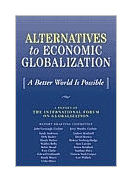|
||
• wydawnictwa polskie
• Zamów informacje o nowościach z wybranego tematu • kontakt
• Cookies na stronie |
ALTERNATIVES TO ECONOMIC GLOBALIZATIONwydawnictwo: BERRETT-KOEHLER , rok wydania 2002, wydanie I cena netto: Summary The definitive document of the anti-corporate globalization movement-the consensus report of an alliance of leading activists, scholars, economists, researchers, and writers Offers a constructive, coherent, positive alternative to globalization-the very thing that the anti-corporate globalization movement is always accused of not putting forward The International Forum on Globalization consists of the leaders of over 60 organizations in 25 countries -including such prominent organizations as Friends of the Earth, the Third World Network, the Sierra Club, the Institute for Policy Studies, Public Citizen, Rainforest Action Network, and Food First Description Alternatives to Economic Globalization is the culmination of a three-year project by the International Forum on Globalization to define alternatives to the current corporate model of globalization. Written by a premier group of eighteen thinkers from around the world, Alternatives to Economic Globalization, the official consensus report of the International Forum on Globalization, lays out alternatives to the corporate globalization more fully, specifically, and thoughtfully than has ever been done before. Synopsis The culmination of a three-year project by the International Forum on Globalization, Alternatives to Economic Globalization presents an alternative to corporate domination of the world economy more fully, specifically, and thoughtfully than has ever been done before. The book begins with a thorough critique of economic globalization, examining its ideological underpinnings and detailing its many negative economic and environmental effects. The authors then lay out ten governing principles for a new social paradigm, one that will lead to truly democratic and sustainable societies that benefit the many rather than the few. The authors detail how particularly vital goods and services (for example, water or genetic material) can be administered for the common good rather than privatized for profit or monopolized for control. They recommend specific policies that can remove the power to make economic decisions from distant corporations and return it to the people directly affected by them. They explore how to rein in corporate domination by eliminating corporate welfare, special corporate rights, and the mechanisms by which corporations exert influence over public policy. They spell out alternatives to the World Bank, the IMF, and the WTO that advance democracy, basic rights, and ecological sustainability. And they offer policies for rebuilding economies in a way that is responsive to human needs, describing alternative operating systems for energy, agriculture and food systems, transportation, and manufacturing. Endorsements "At this critical moment in history, Alternatives to Economic Globalization could not be more timely. The joint authors comprise some of the most articulate and powerful voices of dissent, thought leaders who insist that democracy, participation, and common rights form the basis of a world that will provide real wealth for all." Paul G. Hawken, author of The Ecology of Commerce Table of Contents Introduction Part I: A Critique of Corporate Globalization Key Ingredients of the Globalization Model Bureaucratic Expressions of Globalization Part II: Ten Principles for Sustainable Societies Part III: The Commons: What Should Be Off-Limits to Globalization? Understanding the Commons Current Threats to the Commons The Tradition of the Commons Threats to the Modern Commons Proposals Part IV: The Case for Subsidiarity: Bias Away from the Global Toward the Local Understanding Subsidiarity The Road to the Local Investment and Finance Issues Response to Critics of Subsidiarity Conclusion Part V: Corporate Structure and Power Corporate Structure Today Citizen Actions Against Corporate Power Ending Corporate-State Collusion Toward Alternative Business Structures Part VI: Alternative Operating Systems Energy Systems Transportation Systems Agriculture and Food Systems Manufacturing Systems Measurements of Economic Progress Part VII: From Bretton Woods Toward Alternatives A Review of the Current Situation Essential Rules of a Just and Sustainable International Trade and Finance System Restructuring the Instituional Framework Strengthening the Countervailing Powers of the U.N. System Creating New Global Institutions Part VIII: Conclusions 268 PAGES Księgarnia nie działa. Nie odpowiadamy na pytania i nie realizujemy zamówien. Do odwolania !. |


